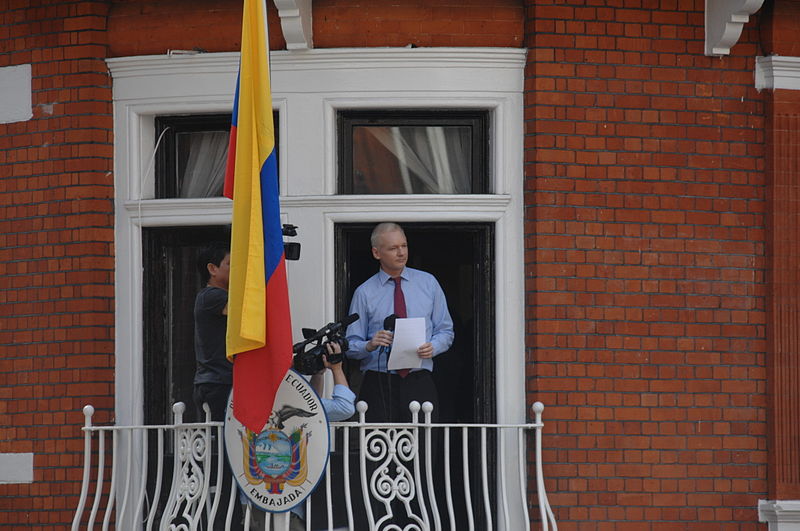Assange is a journalist. He also may be a crook.
Julian Assange is a publisher and a journalist. But he also may be a crook. Helping hack U,S. secrets is a crime whether or not you’re a journalist.
Glenn Greenwald told Democracy Now! last week that U.S. charges against Assange amount to “the criminalization of journalism by the Trump Justice Department and the gravest threat to press freedom, by far, under the Trump presidency.”

No. Charging Assange with hacking is not criminalizing journalism. Journalists don’t hack computers and if they do they can be prosecuted. And no, it’s not the worst threat to press freedom under the Trump presidency. The president’s war on the truth and crusade against the “enemy of the people” is Trump’s worst threat to the press and democracy.
Greenwald, the former Guardian advocacy reporter who won a Pulitzer for Snowden/NSA stories, went on to say “Every journalist in the world should be raising their voice as loudly as possible to protest and denounce this.”
Many sober-minded journalists are ready to join in that protest, but they should stop and reconsider.
The Espionage Act is more than a century old, but no journalist has ever been prosecuted for publishing secrets. The leakers, the whistleblowers who give those secrets to journalists are prosecuted, but not the journalists. It’s an important distinction.
If the U.S. government were to charge Assange with espionage, then journalists would have reason to worry. Prosecuting a publisher —even a nasty, anti-American, Russian accomplice like Assange – would set a worrisome precedent the next time a president got mad about the publication of embarrassing government secrets.
It’s often forgotten that in the same pro-press decision in which the Supreme Court said President Nixon couldn’t stop the press from publishing the Pentagon Papers, it also suggested there would be no problem charging the reporters and publisher with violating the Espionage Act.
But, in the Assange case, the Justice Department seems to have taken pains to avoid using the Espionage Act and instead charged Assange with the crime of hacking, which has no protection under the First Amendment.
As broad a protection as the First Amendment provides, it doesn’t protect journalists who violate ordinary laws, such as trespassing, stealing and – in this case – computer hacking.
If the top reporters of The New York Times and Washington Post helped a whistleblower crack a password and hack into government secrets, the reporter would almost certainly be charged with hacking.
Bruce Brown, executive director of the Reporters Committee for Freedom of the Press, put it this way to David Ignatius of the Post. “When you read the indictment, it doesn’t look like anything turns on whether Assange is or is not a journalist. No newsroom lawyer would tell a reporter it’s OK to do what’s alleged in the complaint: to help a source break a password and hack a computer.”
The Justice Department may not have charged Assange with espionage because it’s uncertain prosecutors could win a conviction. The World War I era law is written so broadly that one of its sponsors said a newspaper publishing the corn production from Iowa could be prosecuted for helping to aid the enemy.
In order to protect against such a broad interpretation, courts have ruled prosecutors have to prove the “specific intent” to harm the interests of the United States.
For most journalists, there is no proof of that intent. The Times and Post and other news organizations that publish national security secrets do it to help the country face up to unjust wars, prisoner torture, illegal wiretaps of American citizens and domestic intelligence gathering gone wild. They don’t do it as Assange does, to harm the United States. In fact, reputable news organizations vet these stories with the government before publication to make sure no one is put in harm’s way.
Although Assange portrays his hacking as dedicated to the goal of radical transparency and to disclosing U.S. war crimes, he doesn’t show the same interest in disclosing the actions of Vladimir Putin and other dictators. When a consortium of Western media disclosed the Panama Papers, Assange wasn’t interested. He told Al Jazeera, “There was clearly a conscious effort to go with the Putin bashing, North Korea bashing….I didn’t think that was necessary for that story.”
Instead Assange apparently was working with Putin to defeat Hillary Clinton by serving as the mule transmitting DNC/Clinton documents hacked by Russian spies to American news outlets.
The really serious issue that Assange presents to U.S. media is not the threat of his prosecution. It is how responsible news outlets will respond the next time WikiLeaks dumps in their laps the documents a hostile foreign intelligence service wants the American people to read right before an election.


